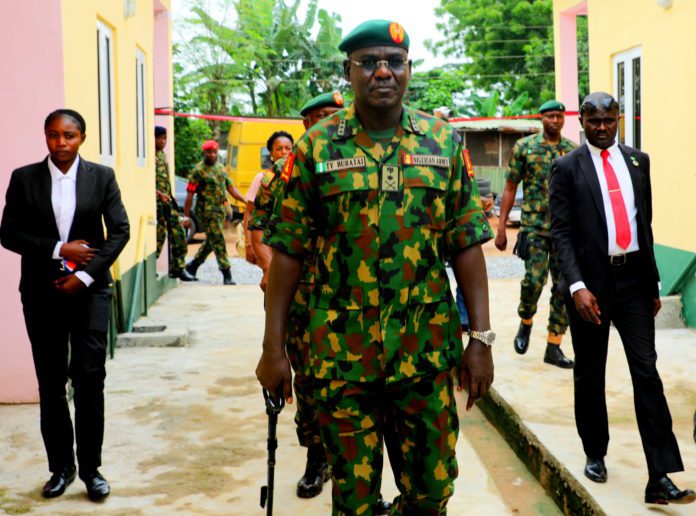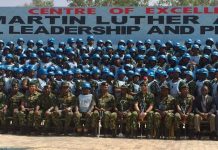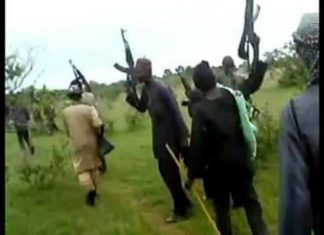By Idoko Ainoko
The Nigerian Army is arguably one of the best in the African continent. Its exploits have been recognized globally by the United Nations, and other entities that have has reasons to give it a pass mark.
This is indeed no mean feat in the sense that most countries regarded by the strength of its military. Constitutionally, the Army is mandated to protect the territorial integrity of the country from external aggression, as well as the preservation of its sovereignty as in the case of Nigeria. This much has been achieved in Nigeria through professionalism and dedication by officers and soldiers of the Nigerian Army. It is therefore not farfetched on why the Nigerian Army is regarded as the pride of the nation.
However, a lot seems to have happened in the Nigerian Army since the return of democracy in Nigeria in 1999. Some have indeed stated in numerous forums that the Nigerian Army suffered neglect under a democracy by previous administration starting from the era of former president Olusegun Obasanjo, who upon assumption of office retired over 93 top military officers whom he considered as politically exposed. I recall that the reason advanced by Olusegun Obasanjo was that the decision was to stabilize and save the country’s democracy.
This position of Olusegun Obasanjo was punctured by some school of thoughts who argued that the principal reason was to prevent a coup against his government. They also contended that Olusegun Obasanjo indeed starved the Nigerian Army of the required funds for its operations in a bid to keep them in check.
While all of these positions cannot be verified, it somewhat points to the fact that the Nigerian Army indeed suffered neglect at some point and this affected its effectiveness and professionalism which was exposed when the Boko Haram terrorist group began its violent campaign against Nigeria in 2009.
We were all witnesses to how the Nigerian Army struggled to keep pace with the activities of the insurgents. Due to years of neglect, those of us in the defence headquarters could easily sense the rustiness in its operations, dearth of equipment, lack of knowledge in asymmetric warfare and many others.
The attendant result of this fact saw the Nigerian Army suffering severe casualties in the battle with Boko Haram as they gained more grounds to the extent of taking over 16 local government areas in North-East Nigeria.
The Nigerian Army indeed struggled to keep pace with the activities of the Boko Haram group who were initially engaged in guerrilla warfare. What made matters worse was that they were operating in challenging terrain, and this gave them the more advantage.
From 2009 till date, the process of rebuilding the Nigerian Army started. I must admit as an insider that indeed former president Goodluck Jonathan began to the process of rebuilding the Nigerian Army. However, his efforts were not complemented by those saddled with running the affairs of the Nigerian Army as it were. I would say without fear or favour that indeed their greed got the better part of them and things got worse despite the enormous allocations.
Monies meant for welfare were diverted to private pockets, monies meant for arms and ammunition were also hijacked and in most instances, substandard and refurbished arms and ammunitions were purchased at very exorbitant prices. And the circle continued not until the coming of President Muhammadu Buhari in 2015.
I won’t say that President Muhammadu Buhari came with the magic wand. However, he indeed did something that reset not just the Nigerian Army, as well as the Nigerian Navy and the Nigerian Air Force. His body language was indeed too loud such that things began to take shape. This much the generality of Nigerians would not know, they felt because he was a former army general, it was expected that his attention would be more on the Nigerian Armed Forces.
That was not the case. What changed the story for the Nigerian Army was the choice of its Service Chief in the person of Lt. Gen. Tukur Buratai. I must admit that not many of us saw his appointment coming as there were others in the Army headquarters that has positioned themselves for the appointment. I recall that Lt. Gen Tukur Buratai was faraway in North-East Nigeria serving as the Commander of the Multinational Joint Taskforce (MJTNF) under the auspices of the Lake Chad Basin Commission and Benin Republic.
So in a way, he was out of the scheming to become Chief of Army Staff as he wasn’t amongst the anointed and positioned ones close to the seat of power as it were. I recall mentioning to a colleague of mine that President Muhammadu Buhari was going to place great emphasis on the Nigerian Army in the appointment of the Chief of Army Staff due to its strategic importance in the fight against Boko Haram. This was going to be strictly on merit regardless of all the scheming and lobbying by top army officers in the Army headquarters.
I would say this for the first time. When the announcement was made, there was indeed palpable silence at the Army headquarters as well as the defence headquarters as some struggled to locate the present position of Tukur Buratai since he was lost somewhere in North-East Nigeria and shuttling between the trenches in the Lake Chad Basin region. And today the rest is history.
Lt. Gen. Tukur Buratia hit the ground running so much so that rumours started making the rounds in the defence headquarters that it was because he is from Borno State which is the epicentre of the war and as such he took the prosecution of the Boko Haram war personal. But they were wrong in the sense that here was an infantry general that has been in the trenches as the Commander of the Multinational Joint Taskforce consisting of about four countries mandated to address the Boko Haram crisis which was fast gaining a regional dimension.
So it was expected that he was going to be proactive in his approach and I must admit that that was precisely what Lt. Gen. Tukur Buratai did and the Nigerian Army of today is indeed better for it. He introduced some very tough reforms in the operations of the Nigeria Army. There was the reintroduction of training and capacity building for army personnel. I recall that special attention was given to providing local and foreign training opportunities for all cadres of officers and soldiers.
Lt. Gen. Tukur Buratai introduced improved welfare packages for officers and soldiers which was lacking and mostly responsible for the lethargy in the Nigerian Army as it were. And this indeed did the magic because you can’t get the best out of people when they are not adequately taken care of or motivated.. This was more strategic in the bid to curb the lethargy that had enveloped the Nigerian Army at the time.
The Nigerian Army has also witnessed a rapid transformation in the area of infrastructural development with the renovations of barracks across the country, improved and upgraded medical facilities to cater for the health needs of officers and soldiers. A good example is the recently commissioned 200 bedded Army Reference Hospital in Maiduguri, Borno State to provide for the healthcare of soldiers who sustained injuries while fighting the counter-insurgency war.
The educational sector of the Nigerian Army has also witnessed a total revamp with the upgrade of all command secondary schools across the country. The Nigerian Military School was also not left out with the reintroduction of military training which was earlier suspended.
The establishment of the Nigerian Army University in Bui, Borno State as a training institution for the development of middle and high-level manpower in the areas of technological empowerment for civilians, appreciation for military policy; logistics and strategy is also worthy of mention.
The Nigerian Army has also embarked on the production of light tactical vehicles and other weapons at the Nigerian Army Vehicle Manufacturing Company (NAVMC) that was commissioned by the Chief of Army Staff in 2019. This marked an indelible milestone in the history of the Nigerian Army’s march towards self-reliance in the production and maintenance of Armored Fighting Vehicles and other classes of vehicles as over the years the Nigerian Army have relied on the importation of such vehicles thereby spending substantial foreign exchange which in turn depletes capital allocations. The strategic importance of the Nigerian Army Vehicle Manufacturing Company is the promotion of the Nigerian Army’s indigenization policy through self-sustenance in armoured and soft skin vehicles.
There has also been the entrenchment of transparency and accountability in the operations and procurement process of the Nigerian Army. This much can be said to be the hallmark of the administrative style of Lt. Gen. Tukur Buratai as the Chief of Army Staff.
I must state that the list is in indeed endless in the reforms that have taken place in the Nigerian Army since the appointment of Lt. Gen. Tukur Buratai as the Chief of Army Staff. In all honesty, there is a lot to be grateful for. This is aside from the fact that the Nigerian Army has been able to take the battle to the Boko Haram insurgents in North-East Nigeria with improved and superior arms and ammunitions as well as an improved and coordinated command structure that saw to the displacement of the insurgents from their operational headquarters in Sambisa forest and the subsequent takeover of all local governments areas hitherto under the control of the Boko Haram insurgents.
Yes, there may be pockets of Boko Haram attacks in North-East Nigeria. However, these attacks are not in the magnitude been reported in the media. Nigerians must come to understand that under Lt. Gen. Tukur Buratai, the Nigerian Army has indeed fared well. Those of us inside and conversant with all the complexity involved in warfare are full of praises for his numerous efforts in the prosecution of the war so far. Some of the details are not for public consumption. But in all, I must say that they are indeed numerous reasons to laud Lt. Gen. Tukur Buratai.
Ainoko is a public affairs analyst and wrote from Kaduna.
Join Television Nigerian Whatsapp Now
Join Television Nigerian Facebook Now
Join Television Nigerian Twitter Now
Join Television Nigerian YouTUbe Now





